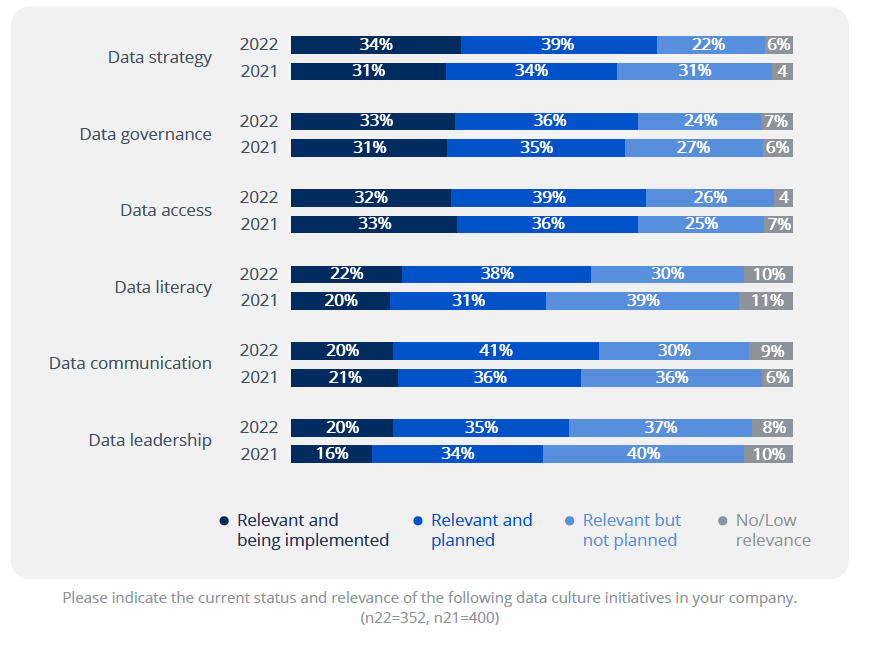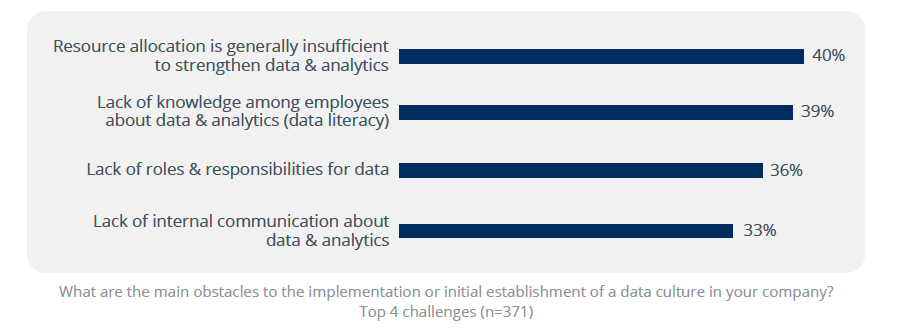Zeenea is a proud sponsor of BARC’s Data Culture Survey 23. Get your free copy here.
In last year’s BARC Data Culture Survey 22, “data access” was selected as the most relevant aspect of BARC’s ‘Data Culture Framework’. Therefore, this year, BARC examined the current status, experiences, and plans of companies with regard to their efforts to create a positive data culture with a special emphasis on ‘data access’.
The study was based on the findings of a worldwide online survey conducted in July and August 2022. The survey was promoted within the BARC panel, as well as via websites and newsletter distribution lists. A total of 384 people took part, representing a variety of different roles, industries, and company sizes.
In this article, discover the achievements & priorities regarding the implementation of data culture from BARC’s Data Culture Survey 23.
The benefits & expectations of data culture are promising
As mentioned in our previous article, one of the major benefits of data culture was improved decision-making, which according to BARC, almost half of the participants achieved.
As seen in the graph below, the benefit with the smallest deviation between expectation and achievement is ‘greater acceptance of decisions’. For just under a third, this is a desirable goal, and nearly all achieve it.
Best-in-class* companies prove that improving their data culture pays off. The benefits are significantly more frequent than the laggards, with the differences between them being greatest when it comes to achieving competitive advantage and revenue growth through the use of data.
BARC also mentions that in Europe, more than 50% of participants expect greater benefits by reducing data silos and a distributed understanding of data than those from the USA & APAC! However, actual benefit achievement is noticeably higher in the USA & APAC, most likely due to the fact that there is a higher adoption rate of new technologies (e.g. more widespread use of data products).

The initiatives companies are taking to improve data culture initiatives
40% of participants are not planning any initiatives in data literacy
Overall, compared to 2021, the importance of data initiatives has increased in each of the 6 aspects of the BARC Data Culture Framework: Data strategy, Data Governance, Data access, Data literacy, Data communication, and Data leadership.
The most significant and the most implemented initiative impacting data culture was Data strategy, with 94% of respondents considering it to be relevant & 73 percent having already launched or planning to launch the initiative.
Closely related to data strategy is the data governance initiative. Governance is seen as an instrument for establishing a secure, consistent, and reliable data ecosystem that meets corporate & legal requirements. Indeed a third of respondents have already implemented governance initiatives and a further 36% have it planned.
Data leadership is also considered relevant in 92 percent of companies. However, only 20 percent have anything in place and 35 percent have implementations planned.

Data leadership is dependent on the generation of leaders. BARC states in their survey “Strategies for Driving Adoption and Usage with BI and Analytics”, that a new generation of data-driven leaders was cited as the strongest driver of BI and analytics tool adoption and usage.
An interesting note from CxOs: 81% of those surveyed claim that data literacy initiatives have already been implemented or are planned, and the corresponding figure for data communication is 78 percent. However, employees in operational functions and data and analytics leaders and experts report less widespread activity – there is work to be done to convince top management that competence and communication are still nowhere near as far advanced as they think!
Data access initiatives have the highest relevance overall at 96% having already been implemented! Data literacy and data communication trail way behind, each with around 40 percent of participants not planning any initiatives in these areas.
The obstacles to overcome for data culture implementation
According to BARC, the top barriers to implementing data culture are the lack of resources, lack of knowledge, organization, and communication. They have consistently been the biggest challenges for data and analytics leaders for a long time. A particular concern is that many are prioritizing initiatives to improve data culture that do not directly address the biggest problems.
For instance, the lack of data literacy is the second most frequent challenge but tackling it is not a high priority for participating companies. Unlike data strategy, data governance, and data access, data literacy is one of the initiatives where a lot is planned but relatively little is done.
In fact, the prevailing opinion is that the purchase of specific data technology or software solves data problems. BARC states that this is not the case. For example, a data catalog without any organization (roles, responsibilities, processes) and active use by data consumers and producers will never be able to deliver the benefits it is designed for.
This also includes data leadership and communication: from the beginning, the goal should be to bring everyone along, empower them, and set an example of data-driven action. This requires creating the necessary space, starting with the development of a data strategy.

Learn more about the data culture trends by downloading the BARC Data Culture Survey
If you’re interested in learning more about the findings of BARC’s Data Culture survey 23 & the importance of democratizing data access, download the document for free!
By downloading the survey, get insights on:
- The assessment of the data access philosophies,
- The effects of the implementation of a data culture,
- The challenges of implementing data access,
- And much more.
* The sample was divided into ‘best-in-class’ and ‘laggards’ in order to identify differences in terms of the current data culture within organizations. This division was made based on the question “How would you rate your company’s data culture compared to your main competitors?”. Companies that have a much better data culture than their competitors are referred to as ‘best-in-class’, while those who have a slightly or much worse data culture than their competitors are classed as ‘laggards’.








